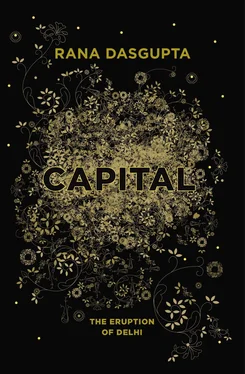“Then you can leave today,” she replied, and evicted him. My father lived in that house for years.
London was supposed to be temporary. My father’s home was in Calcutta, and that was where he would return. He missed his beloved Hindustani classical music, which was just then enjoying an amazing efflorescence in Calcutta: much of his teens he had spent listening, ticketless, at the windows of all-night concerts. And he had raised no protest against the engagement that was arranged for him before his departure — an attempt by his family to inoculate him, for the duration of his absence, against the pernicious attentions of Western girls.
But London in the early 1960s gave my father an ecstatic jolt. He had always wanted to be free of constraints, and now he found himself in a freewheeling world of people and experiences. He read about European history. He fell in love with jazz: he went to see Ella and Louis at the Albert Hall. He found himself in a professional system that was gratifying in its simplicity: you worked hard and you got promoted — and before long he could send money home. He was surrounded by other newcomers like him, free, suddenly, of all ties, and ready to live hard. He had girlfriends. He went to see movies and West End shows.
On 12 November 1965, he bought a newspaper in his lunch hour to read about the Rhodesian declaration of independence from the British empire, which had been telegrammed to London on the previous day. Having lived through the paroxysms of one British colony’s independence, he was electrified to read of this audacious secession of another. He walked into a restaurant and was seated at the only remaining place, which was opposite a pretty young woman. He remained buried in his newspaper, however, until the waitress mistakenly served his dish to his neighbour and hers to him. Laughing, my father and the woman exchanged plates and began to talk. They arranged to meet again the next day.
The beginning of this relationship says something more extraordinary about my mother than about my father. He had seen something of the world, he was far from home, and he was twenty-seven years old. My mother was eighteen and working as a clerk in an insurance company. She still lived with her working-class parents in a small town in Essex, where life revolved around church fêtes, neighbourhood gossip and fish for tea on Fridays. She had met precisely one Indian before that day in 1965. There were many around her who were appalled at this new friendship. Her parents were unhappy; friends stopped speaking to her. And yet the romance endured. They went on holiday to Italy. My father sent photographs to show his family in Calcutta what European idylls he was now able to enjoy; he took scissors to them so they would not see the Western girl with whom he travelled.
He still entertained the idea that all this was temporary and he was eventually going back. But as time went by, he found himself drawn in. Before long, he was married, living in Kent, and playing on the village cricket team. Before long he had children and an excellent situation with a multinational corporation. Before long, he was staying.
My father, whose career was a great success, who sent his two children to Oxford, and who was made a Member of the Order of the British Empire in recognition of his services to his adopted country, is in many ways a paragon of immigrant achievement. But this is not the whole story. It does not explain the listlessness he has in retirement, the feeling of never having really arrived. It does not explain the inchoate grief that lingers behind his still-energetic exterior — a grief that even he cannot really articulate, and that flows freely only when he lies in the bath with the door shut and listens to Hindustani classical music. It is the grief of a kind of exile — unimposed, unintentional even, but real all the same. The exile of devoting one’s life to a place where people understand nothing of the powerful and shattering experiences that formed him. The exile, simultaneously, of losing all means of return — because to his family members in Calcutta he gradually became an incomprehensible foreigner whose life did not translate into theirs: they became awkward and subdued around him. His parents died long ago. Some of his siblings have visited his home in Cambridge, but these visits have never quite brought the consummation he desires. The physical evidence of his life — a house, photographs, an accumulation of objects — somehow fails to disclose life itself, and even in his own front room there can be incomprehension. Meanwhile, his own trips to Calcutta — “home” as he still says — are even less satisfying, for the environment he grew up in has been completely obliterated in half a century, and he can find nothing of himself. These days, Kolkata, whose name has changed too, sees him perpetually on the brink of rage: that it is not what it should be, that people have moved on, that he cannot tell his siblings who he is, that even in the house where his parents’ pictures ceremonially hang, there is no one to understand him.
Before all this, back in 1963, at the very beginning, before my mother, before his professional success, my father was travelling one day on the London Underground. He could see his own reflection in the black window opposite and, out of the corner of his eye, he saw there something else: a vision of his father being loaded, dead, into a hearse in Calcutta. It was as if it were happening inside the train compartment and it was so vivid that he could read the name of the firm of undertakers on the side of the car. When he arrived at his friends’ house he told them what he had seen and began to weep so uncontrollably that they could not find it within themselves to tell him the news they had just received by telegram, which only leaked out late that night.
My father had only been away from Calcutta for eighteen months. It is another reason his successes feel so incomplete: the person for whom — in defiance of whom — he pushed himself with such zeal towards achievement never lived to see any part of it.
• • •
At the dawn of the present century I was working for a marketing consultancy firm in New York. The job was becoming a burden: I was increasingly consumed by the novel I was trying to write in the evenings and, moreover, I was in love with a woman who lived on the other side of the world — in Delhi. And so, at the end of 2000, I emulated, contrariwise, my father’s journey.
I arrived with one suitcase and a box of notes and articles I had collected for my writing. Everything else I owned I stored with an uncle in New Jersey. I didn’t think it would be long before I was back. I didn’t know how long it took to write a novel, but it surely couldn’t take more than six months. I had no intention of staying in Delhi: I had passed through it a few times during childhood visits to Calcutta, and remembered it as a polluted, charmless sprawl. I had no doubt I could convince my beloved to forsake it for sparkling Manhattan.
But such attitudes quickly fell away when I arrived in Delhi. It would be too simple to say that I fell in love with the city — it is just as true that I fell in hate — but there was certainly an all-consuming plunge. A drawing-in, as if Delhi’s attractive power exceeded mere like or dislike — for, in 2000, all that was comfortable and settled in the places I had lived before was here in turbulent preparation, and the city was a vortex of prophecy and possibility. I had fallen, by pure chance, into one of the great churns of the age and, without ever planning to do so, I stayed.
I am still there — here. Well over a decade later, my uncle in New Jersey still lugs my dusty possessions from basement to basement each time he moves house.
• • •
At the time I arrived, Delhi had gone through a decade of the changes resulting from the ‘liberalisation’ of 1991 — that is to say, the reforms which led to the dismantling of the closed and centrally planned economy that had been in place since India’s independence, and which opened the country to global flows of products, media and capital.
Читать дальше











